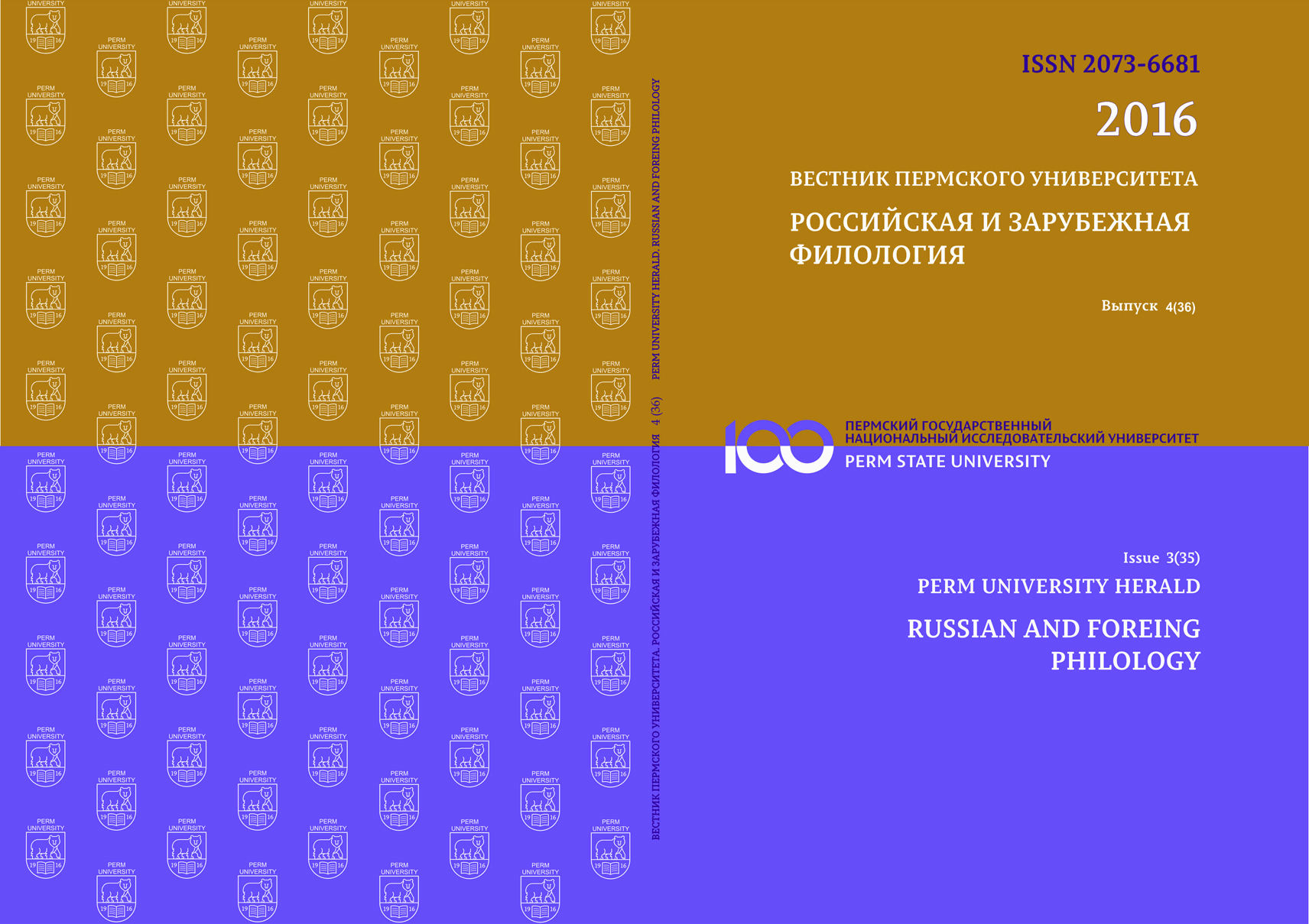MEANS OF REPRESENTING THE CONCEPT DISRESPECT IN ENGLISH TEXT
DOI:
https://doi.org/10.17072/2037-6681-2016-4-58-65Keywords:
concept, concept DISRESPECT, vector concept, subconcept, cognitive domain, cognitive context.Abstract
The aim of the article is to describe the means of representing the concept DISRESPECT in text and to identify subconcepts evoked by these means and also possible combinations of the subconcepts. The study is based on texts by British fiction authors of the second half of the 19th – early 20th century. It is shown that the concept in question has a variety of textual means of representation, which belong to different grammatical classes, mainly adjectives and participles functioning as attributes. Among the nouns that express the concept, a special group is distinguished that includes invectives. In addition, the concept can be expressed by phrases and illocutionary particles. Of special interest are means belonging to different grammatical classes that express DISRESPECT only in specific contexts. The study reveals an important feature of the concept – it appears to be a vector concept representing two types of situations: showing disrespect and reacting to disrespect. The vector type of the concept quite often determines how the subconcepts combine with each other. When disrespect is shown, it is more often that the subconcepts evoked belong to the cognitive domain BEHAVIOR, although they can sometimes belong to two different domains – BEHAVIOR and FEELING. In situations identified as reaction to perceived disrespect, subconcepts that belong to the two different domains are normally evoked together.References
Болдырев Н. Н. Когнитивная семантика: курс лекций по английской филологии. Тамбов: ТГУ, 2001. 123 с.
Болдырев Н. Н. Роль когнитивного контекста в интерпретации мира и знаний о мире // Вестник Челяб. гос. ун-та. № 6(335). Филология. Искусствоведение. 2014. Вып. 88. С. 118–122.
Зилова Е. В. Содержание концепта «БЛАГОПОЛУЧИЕ» / «PROSPERITY» в художественных произведениях британской прозы XIX–XX вв. // Иностранные языки в контексте межкультурной коммуникации: материалы докл. VI Междунар. интернет-конференции «Иностранные языки в контексте межкультурной коммуникации». Саратов: ИЦ «Наука», 2014. С. 20–24.
Коннова М. Н. Когнитивные сдвиги в семантике темпоральных лексем: корпусный аспект // Методы когнитивного анализа семантики слова: компьютерно-корпусный подход. М.: Языки слав. культуры, 2015. С. 269–310.
Минченков А. Г. Английские частицы: функции и перевод. СПб.: Антология, 2004. 95 с.
Минченков А. Г. Когнитивно-эвристическая модель перевода. Saarbrucken: Lambert Academic Publishing, 2011. 278 с.
Минченков А. Г., Горелова А. А. Концепт DISRESPECT и возможности его изучения // Вестник С.-Петерб. ун-та. Серия 9. Филология. Востоковедение. Журналистика. 2015. № 2. С. 122–129.
Хусаенова А. 3. Когнитивно-лингвистическое исследование кластерного концепта PRIVACY: автореф. дис. … канд. филол. наук. СПб., 2009. 17 с.
Hervey S., Higgins I. Thinking Translation. London: Routledge, 1999. 261 р.
Langacker R. Cognitive Grammar: A Basic Introduction. Oxford: Oxford University Press, 2008. 562 p.
References
Boldyrev N. N. Kognitivnaja semantika: kurs lektsij po anglijskoj filologii [Cognitive semantics: a course of lectures on English philology]. Tambov, Tambov St. Univ. Publ., 2001. 123 p.
Boldyrev N. N. Rol’ kognitivnogo konteksta v interpretatsii mira i znanij o mire [The role of cognitive context in the interpretation of the world and our knowledge of the world]. Vestnik Chelyabinskogo gosudarstvennogo universiteta. № 6 (335). Filologija, iskusstvovedenije. [Chelyabinsk State University Bulletin. № 6(335). Philology. Study of Art]. 2014. Iss. 88. P. 118–122.
Zilova E. V. Soderzhanije kontsepta ‘BLAGOPOLUCHIJE’/’PROSPERITY’ v khudozhestvennykh proizvedeniyakh britanskoy prozy 19–20 vv. [The content of the concept ‘PROSPERITY’ in the British prose of the 19–20th centuries]. Inostrannyje jazyki v kontekste mezhkul’turnoj kommunikatsii: Materialy dokladov 4 Mezhdunarodnoy Internet-Konferentsii “Inostrannyje jazyki v kontekste mezhkul’turnoj kommunikatsii” [Foreign Languages in the Context of Intercultural Communication: Collection of reports of the 4th International Internet-Conference “Foreign Languages in the Context of Intercultural Communication”]. Saratov, Nauka Publ., 2014. P. 20–24.
Konnova M. N. Kognitivnyje sdvigi v semantike temporal’nykh leksem: korpusnyj aspekt [Cognitive shifts in semantics of temporal lexemes: corpus-based approach]. Metody kognotivnogo analiza semantiki slova: kompjuterno-korpusnyj podkhod [Methods of cognitive analysis of word semantics: computer-corpus-based approach]. Moscow, Jaziki Slavjanskoj Kul’tury Publ., 2015. P. 269–310.
Minchenkov A. G. Anglijskije chastitsy: funktsii i perevod [English particles: functions and translation]. St. Petersburg, Antologija Publ., 2004. 95 p.
Minchenkov A. G. Kognitivno-evristicheskaya model’ perevoda [Cognitive-heuristic model of translation]. Saarbrucken, Lambert Academic Publishing, 2011. 278 p.
Minchenkov A. G., Gorelova A. A. Kontsept DISRESPECT i vozmozhnosti ego izuchenija [The concept DISRESPECT and ways of studying it]. Vestnik SPbGU. Philologija. Vostokovedenije. Zhurnalistika [Vestnik of St. Petersburg State University. Philology. Asian Studies. Journalism]. 2015. Iss. 2. P. 122–129.
Khusaenova A.Z. Kognitivno-lingvisticheskoje issledovanije klasternogo kontsepta PRIVACY. Diss. kand. filol. nauk [Cognitive-linguistic study of the cluster concept PRIVACY. Cand. philol. sci. diss.]. St. Petersburg, 2009. 17 p.
Hervey S., Higgins I. Thinking Translation. London, Routledge, 1999. 261 р.
Langacker R. Cognitive Grammar: A Basic Introduction. Oxford, Oxford University Press, 2008. 562 p.




